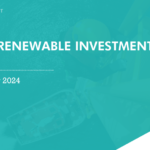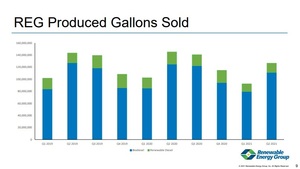IRFA summit focuses on policy, future market opportunities
Energy Disrupter
ADVERTISEMENT
The 2022 Iowa Renewable Fuels Summit, held Jan. 25, highlighted significant opportunities for growth driven by demand for advanced biofuels, such as sustainable aviation fuel (SAF), but also addressed policy and economic concerns impacting biofuel producers.
Monte Shaw, executive director of the Iowa Renewable Fuels Association, provided an overview of political and regulatory issues impacting the biofuels sector, stressing that Iowa’s biofuel industry is “fed up but fired up.”
The industry entered 2021 with renewed optimism, he said. “Vaccines were rolling out and it felt like we were turning the corner on COVID.” The Biden administration’s stated commitment to biofuels and the U.S. EPA’s announcement that it would rein in small refinery exemptions (SREs) added to the hopeful outlook. That optimism, however, began to fade as the year went on, Shaw said. The Delta and Omicron waves of COVID put economic recovery in question and supply chain issues are driving high inflation rates. “The RFS exemption denials did not come. The DC Circuit Court threw out year-round E15,” Shaw said. “The Biden Build Back Better bill rolled out with billions for electric vehicles (EVs) and nothing initially for renewables.”
The EPA finally released its proposed Renewable Fuel Standard renewable volume obligations (RVOs) for 2021 and 2022 in late 2021. While the proposed RVO for 2022 is strong, Shaw called the proposed 2021 RVO disappointing and said the agency’s decision to reopen, and likely reduce, the 2020 RVO is dismaying. “And throughout the year from Washington, D.C., came an incessant drumbeat that electric vehicles were the only solution for our transportation future,” he said, thanking the Iowa delegation for standing united across party lines in support of biofuels.
Shaw stressed that biofuels must play a part in decarbonizing transportation, noting that the RFS is the only federal law on the books today designed to reduce greenhouse gas (GHG) emissions from transportation fuels.
“I can clearly say the state of the Iowa biofuels industry in 2022 is fed up, but fired up,” Shaw said. “We are fed up at seemingly being ignored or marginalized, but we are fired up to succeed in spite of it.”
Shaw addressed the potential that carbon capture offers to biofuel and ag prodcuers. “When corn and soybean plants grow, they suck CO2 out of the atmosphere,” he said. “With improved efficiencies at the farm and biofuel plant level, I firmly believe that one day biofuels can and will be net carbon negative. Achieving that goal will require carbon sequestration and carbon pipelines. These projects are essential to the long-term viability of biofuels. As a guy still active in my family’s farming operation, I know how emotional some of these issues can be. So, I pledge to work with farmers and policymakers to ensure we have a fair and equitable path forward.”
Regarding the need for year-round E15, Shaw applauded Iowa Gov. Kim Reynolds for leading a Midwest effort to find a regional solution in the absence of federal action. “The Clean Air Act allows governors to take action to ensure the regulatory treatment for E10 and E15 is the same,” Shaw said. “By exercising this authority, governors can restore year-round E15 sales for retailers and motorists. IRFA is proud to be working with Gov. Reynolds and groups in other states to push for a Midwest E15 solution.”
Several speakers at the event discussed the significant opportunity offered by rapidly expanding demand for drop-in biofuels, such as renewable diesel and SAF.
Donnell Rehagen, CEO of Clean Fuels Alliance America, delivered a keynote address that discussed the substantial growth potential offered by SAF and renewable diesel. While federal policy in support of biofuels is incredibly important, Rehagen stressed that state-level policies also help to drive growth in demand for biofuels.
State policies currently create markets for approximately 1.9 billion gallons of biodiesel and renewable diesel, he said. By 2030, Rehagen said state markets could drive that demand to 5.3 billion gallons, with California leading that demand at more than 3 billion gallons. Corporate policy is also expected to have a huge impact on demand for biodiesel, renewable diesel and SAF moving forward, Rehagen said, as companies like Amazon and Microsoft work to reduce supply chain emissions.
Steve Csonka, executive director of the Commercial Aviation Alterative Fuels Initiative, spoke about the potential of SAF during a roundtable on emerging markets. He said in the U.S. alone, the aviation industry offers a 26-billion-gallon market opportunity. Worldwide, the market for aviation fuel is nearly 100 billion gallons—and that market will continue to grow. Jet fuel demand is expected to expand by 3-5 percent annually for the foreseeable future, he said, driven largely by developing economies. Increased fossil fuel consumption also means increasing GHG emissions.
“We don’t see anything on the horizon that allows us to curtail that other than the use of SAF,” Csonka said, noting SAF is the only reasonable approach to reducing GHG emissions from the aviation sector.
SAF can achieve GHG reductions of 65 percent and higher, with some technologies showing the ability to be carbon-negative. Ethanol can be used as a feedstock for SAF production, Csonka said, but stressed that ethanol used as a feedstock for SAF will need to have a low carbon index to ensure finished fuel has a carbon reduction of at least 50-60 percent.
Csonka also discussed the need for SAF to be both affordable and sustainable in order for the aviation sector to truely embrace the use renewable fuels. The global aviation industry has set a goal to be net zero by 2050, with focus on the use of SAF, he said “We expect 65 percent of our reduction worldwide to come from the use of SAF,” Csonka added, noting that there are interim commitments for 10 percent SAF use by 2030.
The Iowa Renewable Fuels Summit also featured roundtable discussions focused reducing the carbon footprint of biofuels, renewable fuels policy and the economic outlook.
The IRFA plans to post full replays of the summit presentations to its YouTube page soon.
















